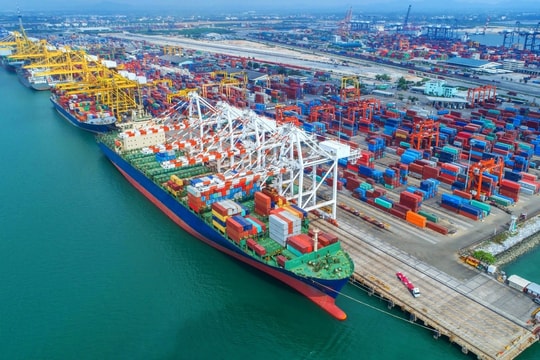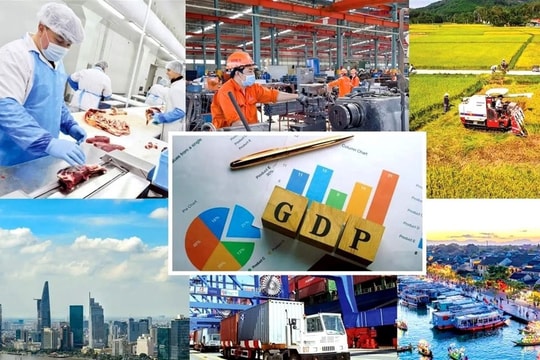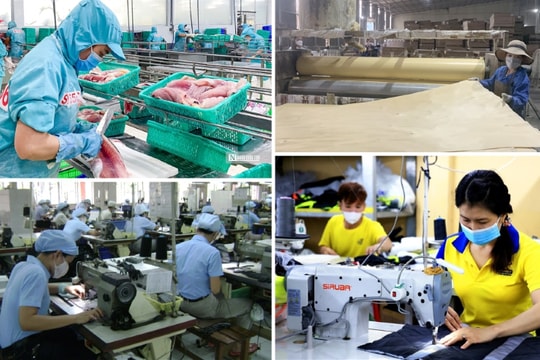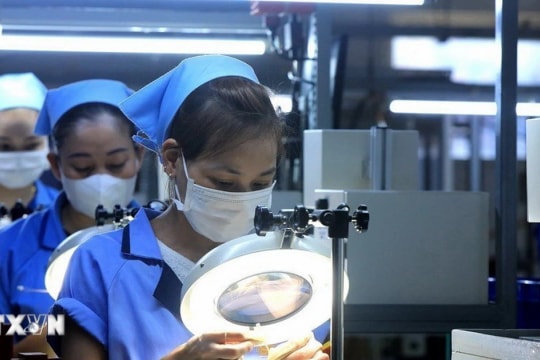What will Vietnam's economy be like in the future?
As many sectors are frozen and the Government's shock-relief policy has not yet come into effect, the economic picture is forecast to be "darker" than the first quarter.
'Every scenario is difficult'
GDP in the first quarter increased by only 3.82%, the lowest in 11 years. According to Associate Professor Dr. Nguyen Khac Quoc Bao - Head of the Finance Department of the University of Economics, Ho Chi Minh City, the GDP growth was partly due to the growth momentum of the period before Tet.
But as Vietnam enters the third phase of the fight against the pandemic with lockdown measures and many sectors frozen, growth will be much more difficult. In addition to the reason of weakened economic dynamics, the delay in economic support packages will also make the situation in the second quarter more difficult. "The second half of the second quarter will witness the consequences of these impacts coming into life," Mr. Bao said.
Associate Professor Dr. To Trung Thanh - Head of the Department of Science Management at the National Economics University, said that if the epidemic only lasts 2-3 months, many small businesses will stop operating, while large businesses can still pay workers with minimum wage contracts. But if the epidemic lasts longer, the economy will sink deeper into the spiral of declining aggregate supply and aggregate demand and will likely fall into recession.

A deserted intersection in Ho Chi Minh City during social distancing. Photo:Nhu Quynh.
Businesses with weak financial resources are forced to stop operations and lay off employees. This unemployed workforce will cause demand in the economy to decline further, affecting businesses in other industries.
"If so, it will lead to an increase in bad debt in the banking system, affecting the ability to supply capital to other industries," Mr. Thanh analyzed.
According to a study by a group of experts from the National Economics University, if the epidemic lasts until the end of June, GDP growth in the second quarter is forecast to decrease by about 2% compared to the same period.
Vietnam's export value is estimated to decrease by 25% in the second quarter and narrow the decline to 15% in the following quarters of 2020. Similarly, domestic trade value also decreased by 30%. The tourism and hotel sectors will be greatly affected with an expected decrease of 30-40% in the number of visitors, an estimated decrease of 40% in revenue, and a decrease of 30-40% in the number of jobs. The service trade sector will witness changes with medical services and essential services growing by 25-40%, while ancillary services will decrease by 20-40%.
The Vietnam Institute for Economic and Policy Research (VEPR) forecasts that the second quarter, in any scenario, will see negative growth. If the domestic epidemic is completely controlled by mid-May and economic activities gradually return to normal, GDP growth in the second quarter will still be negative 3.3%. In the remaining two scenarios, the worst impact of Covid-19 on the economy will appear in the second and third quarters, then GDP growth in the second quarter will be negative 4.9-5.1%.
The sectors most affected include: transportation & warehousing, accommodation & catering services, arts & entertainment with an estimated growth rate of 20-50%, even 25-70%. Meanwhile, the agriculture, forestry and fishery sector reversed from weak positive growth in the first quarter to negative growth starting from the second quarter due to a growth rate decrease of 1-5%. Similarly, the mining industry is forecast by VEPR to have negative growth until the end of 2020. Meanwhile, the processing and manufacturing industry will continue to have negative growth until the end of the third quarter.
Bright spots in the second quarter economic picture appeared in the healthcare, communications, finance, banking, and insurance sectors due to increased activities related to epidemic prevention, according to VEPR.
"The new normal"
Vietnam is an open, small economy, mainly engaged in processing and manufacturing, so it is vulnerable due to its heavy dependence on international trade and investment partners. Therefore, Associate Professor Dr. Nguyen Khac Quoc Bao believes that the ability to recover depends on the businesses of the partner country and the global environment. However, after each crisis, multinational companies tend to shrink, cluster, and even restructure, so divestment is likely to occur.
"If this happens, even if the epidemic is successfully controlled, the economy will return to a state that is no longer the same as before, temporarily called the new normal state," Mr. Bao said.
According to Mr. Bao, the "new normal" is that each individual and organization is forced to slow down and change themselves in the face of new, more severe circumstances. If they can adapt and find more effective operating models, they will transform their organization into a new form. When this happens on a large scale, it will create a ripple effect and resonance that changes the structure of the entire economy.

People in difficult circumstances wait to receive gifts from a charity group on Ly Chinh Thang Street (District 3, Ho Chi Minh City) on the afternoon of April 3. Photo:Nguyet Nhi.
Dr. Vu Thanh Tu Anh - Director of Fulbright School of Public Policy and Management - said that a paradox occurred in the first quarter when GDP growth decreased but CPI reached a 5-year high. The reason was that the price of food and foodstuffs - the group of goods with the largest proportion in the CPI basket - increased rapidly, pushing the price level up.
According to Mr. Tu Anh, when the production capacity of the above-mentioned items is limited due to disruptions and delays in global supply chains, it will lead to a decrease in the supply capacity of goods, causing the value of goods to increase.
He predicted that if the Government does not maintain the production capacity of some essential goods, as soon as the epidemic is over, the poor will face pressure from prices of goods increasing several times, similar to the situation that happened in Wuhan.
Mr. To Trung Thanh expressed concern that the cost of epidemic prevention and the total value of the Government's short-term support packages are increasing rapidly, while the budget is facing difficulties due to reduced revenue, causing resources for development investment to decrease. In addition, human capital is also sharply reduced due to illness, and the quality of education is declining. From there, the long-term growth of the economy will be affected.
Opportunity for all "restructuring"
When the export market is difficult, farmers in the West learn to use online marketing and sales tools to find outlets for their products. According to expert Bao, this story shows that, whether they want it or not, farmers are forced to innovate and overcome previous limitations.
Similarly, Associate Professor Dr. Nguyen Duc Thanh said that Covid-19 will have a big impact on businesses operating in the traditional way - directly contacting partners and consumers. On the contrary, businesses that already have online sales and transaction platforms will rise.
From Alibaba's transformation when SARS broke out in 2003, it can be affirmed that the digital economy will minimize the cost of premises and inventory - the major problems of businesses today and become a trend of the world economy.
"This is an opportunity for Vietnam to nurture startups in the fields of artificial intelligence (AI), technology, and e-commerce," Mr. Thanh shared.
Mr. To Trung Thanh also proposed that some industries can soon take advantage of digital technology to create big changes in output and productivity such as information and communication technology, manufacturing and processing industry, transportation - logistics, finance - banking.








